"The tent of the students was like a swallow's nest"
Memories of Commander V. V. Potyazhenko
Published by Maria Piskareva on 5 Mar 2014
Olga Zavadskaya visited on March 4 and 5, 2014 spouses Potyazhenko - Victor Vasilyevich and Margarita Ivanovna. March 6, Victor Vasilyevich has a birthday. He is born in 1933.
Olga asked Potyazhenko spouses some questions and informed me about the results of this meeting. Here is her story:
I was visiting today the spouses Potyazhenko. They gave me three hours. Wonderful, simple, cute people! Victor Vasilyevich himself told everything. Of course, much of the memory has been erased or altered. They saw on REN TV a film about Dyatlov group, they called the station but nobody wanted to listen to them. Margarita Ivanovna said that they spent significant amount of money calling. They wanted to correct the mistakes.
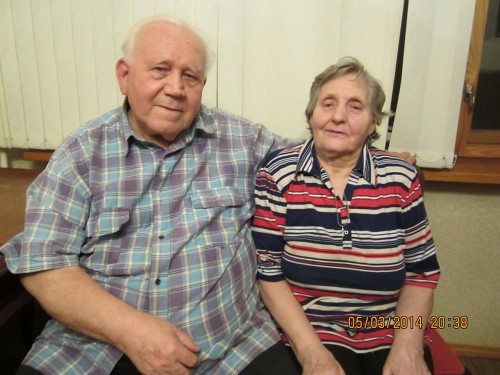
Victor Vasilyevich and Margarita Ivanovna Potyazhenko
Victor Vasilyevich participated in the search for Dyatlov group from February 24-25 to May 5. He was the ONLY ONE flywing to the pass, he only changed helicopters, so they can refuel.
"In Ivdel, Colonel Ortyukov commanded my flights, the order was to fly to Otorten." He doesn’t remember exactly the day when he flew to the pass for the first time, but says it was February 24th or 25th.
Victor Vasilyevich recalls: a white, snow-covered, flat top. The helicopter landed at the rock remnant, which is in the photo in the newspaper. All these photos are from his album.
Potyazhenko flew a MI-4 helicopter by route, which he was told - to Mount Otorten. Along Lozva. The top of the mountain was a bare snow plateau. And he said that it was creepy to fly in that area. In an emergency, he said, we would not have found it.
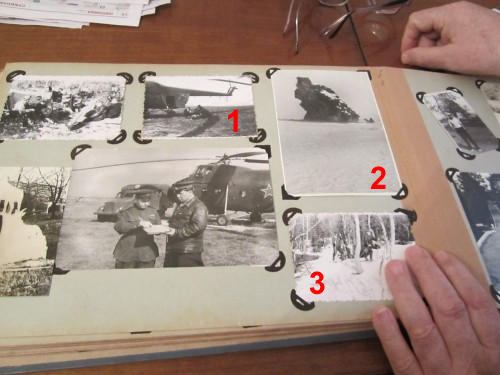
Photos pertinent to the search on the pass: Photo 1 | Photo 2 | Photo 3
Victor Potyazhenko claims that it was he who discovered the tent on the slope during flying over the pass, together with Ortyukov. A small group of comrades in black sheepskin coats were on the ground, with a small tent already pitched in the forest i.e. there were people present already. It can be assumed that Ortyukov was in the dark about the big game, started by someone... Victor Potyazhenko was then a flight commander.
Following orders they flew to Ivdel on the 1st helicopter and Yak-12 aircraft. On the plane Gorlachenko circled the area to survey the area for search to check whether helicopters could fly there. And flew back to Sverdlovsk.
The orders where to fly gave Ortyukov. He flew by helicopter to Otorten. And they sat on the pass at the boot rock.
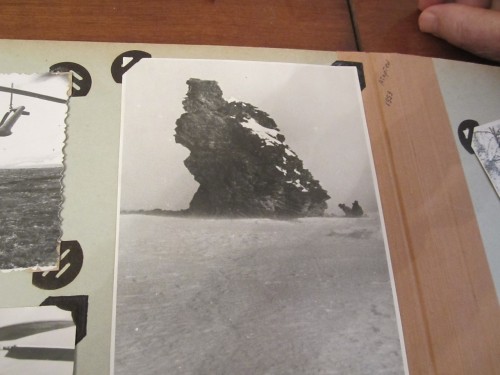
The Yak-12 with General Gorlachenko flew back to Sverdlovsk.
He himself then flew to the search party, brought supplies: food..., people brought there and back. There were 4 people in the crew: technician, navigator...
Pilot Patrushev, he did not know.
But there BEFORE the students there were already a lot of people.
On the first arrival they brought a radio station (weighs 20 kg), the next day - a big stove.
The day after they discovered the tent from the air, they flew in with the investigator and prosecutor, with Ortyukov.
And the next day, the bodies were found.
Victor Vasilyevich says that he didn’t see any students at first, only the military. And on the first flight, besides the investigator, were flying people in black fur coats.
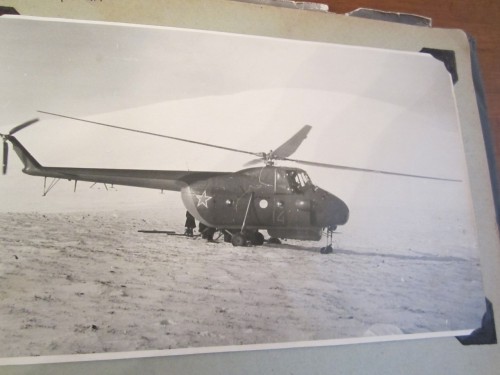
The helicopter could take on board up to 12 people (max - 16). He flew to the pass alone, only changed helicopters.
Victor Vasilyevich approached the tent, the tent was not heavily covered with snow. The tent itself was not tilted, with a slight imclination, the sidewall was cut... He looked through the entrance and saw the combat leaflet attached near the entrance ...
The tent was not collapsed, covered with snow only from the side of the slope. On the opposite side there were cuts. You could could see inside the tent. I asked today how was the combat leaflet attached? He said literally the following: "As if wetted and glued to the tent, and the water froze." It was written: Combat leaflet, below: "Evening Otorten", and lower on two halves - on one: what they did today, on the other: tasks for tomorrow.
About the flashlight he didn't say anything. I asked twice about the flashlight. He said: "a flashlight, a light bulb...", and kept thinking.
Victor Vasilyevich said that he did not correspond with journalist G.K. Grigoriev.
We flew to the pass without refueling. The airfield is 3 km from Ivdel. Apparently, he confuses the mileage. It seems to him that they flew quickly. If he had been given a normal aeronautical map it's 5 km, he would have shown everything. But the wife says to fly is more than an hour. She herself did not participate in the search. She was a radio operator in Ivdel.
One helicopter from Kaunas was called in to help! "The presumption was that there would be a lot of work and I could not do it alone". The pilot was one - Potyazhenko.
Victor Vasilyevich claims that he lifted 3 bodies in early March. He does not remember the rest .. He helped to load them into the helicopter, the corpses were clean, completely frozen (February)
The blades of a helicopter span 21 m, total length 32m.
In the newspaper article the heading is inaccurate - Victor Vasilyevich did not find the dead bodies. Only the tent on the slope, "a tent like a swallow's nest"...
Victor Vasilyevich flew to visit the Mansi Stepan Kurikov with him on the search with the permission of Colonel Ortyukov.
Margarita Ivanovna told how she was on duty (radio operator in the Ural district). On radar - a stranger aircraft .... "It was May 1, 1960. It is not pertinent to the search ”- remarks V. V. Potyazhenko.
Margarita Ivanovna flew to the slope only once, out of curiosity.
A dog bit her in Ivdel. Apparently, the dog didn’t like something, and slightly bit Margaret Ivanovna’s foot.
Victor Vasilyevich wanted to say that there were very clever dogs on the slope.
And, by the way, the spouses don't find"extraterrestrial trace" in the death of the group.
V. V. said that in May he did not refuse to carry bodies to Sverdlovsk, since only there was a requirement to put them in metal containers. No one threatened him with a pistol. He didn't have a gun either. In the photo* with the holster it is not him. Again, there was no gun.
* Olga Zavadskaya had with her this photo. She asked him if he was the man to the right with the holster. V. V. said no. Later on we speculate that he might be the man on the left with the USSR Air Force pilot cap with wings insignia, but this is not confirmed.
Margarita Ivanovna was not his wife at that time, they married a year later. He took her from Ivdel. In 1959 she worked at the airfield in Ivdel as radio operator. They only requested weather reports from the pass. And there is a radiogram asking about a meteorocket.
Margarita Ivanovna claims that the Patrushev was not allowed to fly to the pass, he did not fly there.
It is interesting that V. V. does not remember any students. That he transported only a soldier. He did not dropped off anyone at Otorten... He was the flight commander of the rescue team. Victor Vasilyevich himself said that it was very difficult for a helicopter to fly there. "It is even harder than even in the Caucasus mountains..."
Many of V.V. Potyazhenko's answers raised new questions, it was necessary to clarify them one by one, when and with whom Victor Vasilyevich flew to the pass for the first time. Olga gave me the phone number of the spouses Potyazhenko, and I called them.
Victor Vasilyevich answered all the questions, we talked for a long time, the telephone connection was breaking, but I dialed his number again and again until I found out all the incomprehensible moments for me. Many thanks to Victor Vasilyevich for this conversation, for the kindness with which he treated me.
Our conversations followed the questions.
– Victor Vasilyevich, the article in the local newspaper has caused a great debate on the Internet. I myself did not understand a lot. Please, let's step through each vague point. First question: You received an order to fly to the pass. Where were you at this time?
– Where I served. Aramil.
– You got to the helicopter and flew directly to the search area as ordered?
– We flew to Ivdel. From there Gorlachenko on a plane flew over the area for search. I looked whether everything was normal there, safe for our helicopters to fly. He told me to stay behind for the main (search - ed. note), get settled, and he flew away to Sverdlovsk.
– You flew on February 23?
– We flew on February 24 since the orders were military aircraft not to fly on holidays.
– Who flew with you on your first flight to the search area?
– Colonel Ortyukov, an investigator, someone else from the investigators, several people in black fur coats and dog handlers with dogs. The first flight: looked where to land, how to land. A military camp was already set up at Mount Otorten. They cut a hole for me. I looked ... I can't land.
– Where did you fly, as the area was called?
– I don't remember the names. Otorten, I did not know any other mountains, I must say. I call it the "Otorten mountain region". There was already a camp, a small tent. They cut a site in a forest measuring 30 by 30, but I have a helicopter blade size of 32 meters; I said I would not land down. Landed on the rock remnant. ... they unloaded a large stove and a large army tent. They brought them a radio station.
I asked them to cut an area at least 50 by 50m and cut a 500m passage to it. When they were ready, I landed on this site only once. The cargo was unloaded while hovering. After that I brought pilots to learn how to land in this well. We trained there.
– What kind of radio station?
– Such a simple box. You pick up the handset and talk. Like a phone.
– The men in black fur coats*, who do you think they were? Military army or military from Ivdellag? Were they armed?
* At that time there were two types of fur coats used in the military made from sheepskin: guard's coat and officer's coat, they both were made in light and dark color. Here in an example of a man wearing black officer's coat on the pass. Looking at the search photos from 1959 I was pondering how come Potyazhenko made a note of the black and not the lighter color sheepskin coats like the ones marked with purple arrows in this photo. The red arrow is same man from the previous photo. It might be the that the purple ones are not sheepskin but made from felt i.e. on the collar lapel of a fur coat you can see fur. And there is no fur on the lapel of an overcoat. Could be that Potyazhenko was impressed only by the more expensive sheepskin officer's coats.
– These were from Ivdellag*. Men in black fur coats came, I could not see if they were carrying weapons. They immediately went into the forest.
* The prevailing opinion is that a similar dark coat could be worn by military railway workers (Lt.Col. Shestopalov sappers) or officers of the Ivdellag. The soldiers of Ivdellag wore a green (khaki) uniforms sheepskin coats (тулуп), and quilted jackets (ватник).
– How many dogs?
– Two dogs, dogs were with dog handlers. Tails between their legs. They did not want to leave the helicopter. Later, dog handlers told me that the dogs felt in advance when the helicopter arrived, they were already preparing, waiting. They were afraid that they would be left there.
– How did you find the tent?
– When soared, on acceleration speed and climb; I look - below something looks like a tent. Ortyukov pointed - see! He waved his head.. Said, we'll see tomorrow. We flew to Ivdel, he was connected by radio to a group in the woods, something 500-700 meters from them on the slope flashed something like a tent. Order: "Do not touch it!"
The next day we flew again in the morning.
– Who flew with you?
– Colonel Ortyukov, some investigator and their comrade from the leadership, probably the prosecutor.
– The investigator and the prosecutor were about what age? Young?
– I was 25 years old. They were under 40 years old. Like Ortyukov, 35-40 years old.
We flew in, landed, went along the mountain and saw the tent. From the tent down went a steep descent. The soldiers told Ortyukov that three bodies had been found there. The bodies lay apart at some distance. The first body lay 250 meters from the tent.
The investigator and the prosecutor went to investigate, they walked for 3-4 hours. I waited for the bodies to be found.
– You yourself helped carry the body from the slope to the helicopter?
– Not. I waited for the bodies to be brought and only helped to load these bodies into the helicopter.
– Did you see students on the slope?
– Not. I did not see any students at all.
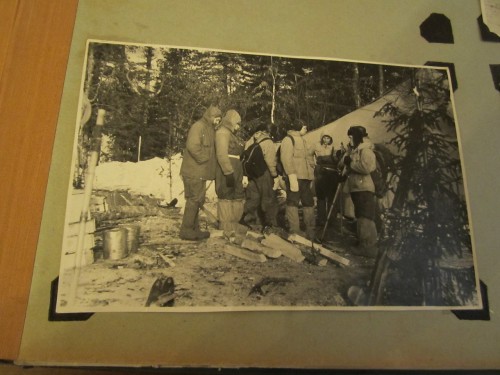
In this photo from V. Potyazhenko's album, we can see search members, it is not clear if they are students. Although we can't figure out yet who the people on the photo are, we had to publish it.
– Was there a girl among these bodies?
– I do not remember. They were stripped and undressed.
– Stripped to the naked body?
– I do not remember. Without shoes and without outerwear.
– How they put the bodies in a helicopter, on a fir tree btanches, on a tarpaulin. Covered with sheet?
– No, just put the body without anything on the floor, on top of each other. The cold was under 50. The bodies rang like glass.
– How many bodies did you personally transport?
– All of them. All 9 bodies. They find them, order me to fly. I fly and take the body. How many times do not remember.
– You brought a group of students to the slope?
– No, I only brought supplies, took away bodies.
– Did you bring woman expert on the slope?
– No. I did not bring women and did not see any there. Once brought my future spouse illegally on the pass, to see. She worked as a radio operator in Ivdel.
– This is her that the dog bit on the slope?
– Not. In a room at the Ivdel airport. And she did not bite, but simply grab her foot with its teeth as if the dog was gonna bite her. Something was not of the dog's liking.
– Tent. You said you looked into the tent. How? Through the entrance, through the incision?
– Through the cut. It was almost all open. Like a torn rag. I raised a cut and looked.
– What did you see in the tent?
– There was no order in the tent. They were changing their clothes in the corners. One could see things in groups, frozen pieces of bread lay around, it seems there was a can of meat. At the entrance I saw a piece of paper. Named Combat Leaflet. I was surprised, just like in the army - a combat sheet.
– How was it located in the tent, attached to a wall or lying around?
– I do not remember exactly. It seems to me that he was somehow attached to the wall of the tent. Wetted whether with tea, or saliva - and frozen.
– Were there drawings in this combat sheet? What was written there? Tell in detail about this leaflet.
– There were no drawings. I did not read what was in it. I remembered that it was written "Tasks for tomorrow." They wrote with pencil. It was obvious that they wrote in field conditions. Pencil in some places broke through the paper. The handwriting was so uneven. As if written on a knee.
– Did you see lamp in the tent?
– Not. I told reporters that I remember a flashlight with a light bulb.
– Why did you say that the tent was like a swallow's nest?
– I didn't say that. This is how the military told Ortyukov when they went after his message on the radio and found a tent. It was stuck to the mountain, like a swallow's nest. Then I heard the words of one specialist on the slope that the tent was set up incorrectly, that this is not how you pitch a tent.
– Did you see a stove in the tent?
– No, I didn't.
– Did you see any cut stick in the tent?
– Stick? No, I didn't. I don't remember.
– Has it been trampled around the tent?
– No, it was not. There were no footprints near the tent and from the tent. We saw the tracks below the tent, they went down and were interrupted. Because of the terrain. There is such a terrain - 5 meters of snow, then bare rocks, then snow, then again stones, then snow again.
– Were the items been crumpled? Covered with snow? Were there boots in the tent or at the tent? Did any belongings lay around the tent?
– There were no items in the tent. Everything in the tent was covered with snow. Now I wondered if there was snow in the tent... It must have been, but I did not see it... I don't remember. Ski poles protruded from the snow by about 8 cm. (note: here V.V. said something about the sun, and the wind, and the holes at the tent, but I didn't catch it, didn't understand and did not write it down specifically)
– Did you eavesdrop what were the investigator and the prosecutor talking about?
– No, all the conversations were secret from everyone. They went and looked. Negotiated with each other, they talked a lot about something among themselves. The investigator observed all the tracks.
– The first versions were about murder. Didn't they talk about it?
– Yes, at first they talked about murder that the convicts escaped and killed them. Then about Mansi. But Mansi were so downtrodden. It was painful to look at them. Miserable. You can tell man from woman. Poor.
– Did you see any chum on the slope?
– Not. There were no chums there. There was nothing at all, deaf taiga and mountains.
– One comrade told that the pilots changed alcohol for furs and gold, did you see this?
– I do not know, I have not seen this. In general, I flew alone and did not see other helicopters. At the airfield in Ivdel, two people were important to me - dispatcher Ponomarev or Pankratov, I don’t remember already. And the chief meteorological service. Didn't speak to anybody else. Well, to Ortyukov of course.
– Did Ortyukov live in the camp?
– No. He flew with me all the time. Flew in and out. He stayed in the city.
– What was your route? Where did they stop? Did you touch down in Vizhay?
– No. I flew from Aramil to Ivdel at all time - and to the slope. He landed next to the rock remnant.
– Did you see in Ivdel civil aviation?
– No. I saw there MI-1, their airfield was small.
– How many helicopters did you have?
– Three. I flew on different, for about ten days. I flew on one from Ivdel to Aramil for maintenance work, and returned on another. Crew of 3 people.
– What kind of helicopter came from Kaunas?
– It was at the beginning, they thought that I won't cope alone. Therefore, an additional helicopter was sent from Lithuania. But the pilot looked at the slope and said I can't fly there. Fly home, then. I couldn't make him.
– You flew to visit Kurikov?
– Yes. Together with Ortyukov. The Soviet government built Stepan Kurikov a two-story house. He arranged receptions there. And in the courtyard he had a real chum.
– Did you see deer on the slope?
– What are you talking about. There was nothing around. The slope was like that, you walk 5 meters - snow, then bare rocks, this is how strong the wind was, then snow again... There were many deer in Suevat Paul.
– Have you known journalist G.K. Grigoriev?
– Not. I did not know him.
– Did you know such pilots as Karpushin and Patrushev?
– I heard about them only on TV. My wife worked as a radio operator in Ivdel at the airfield, she sometimes heard the name of Patrushev on radio communications.
– What did you mean when you said "broken branches of fir trees, scattered sticks"?
– I saw the remains of a campfire in the woods, this is what I was talking about.
– Do you know the name of Maslennikov?
– No, I have not heard of him
– On the photo (which was shown to Olga Zavadskaya), there is a man with a holster...
– I did not fly with a weapon. Although they gave us weapons, we did not wear them. After the search was over we brought it and handed back in Sverdlovsk.
– Victor Vasilyevich, what was not right in that very first article about you in the local newspaper? How did they find you?
– The title needs to be fixed. I did not find the bodies and did not see them on the ground.
Also, I did not say anything about aliens. I just told what a military man told me (about a luminous "donut") and told something that happened to me. About the figures. I do not associate the cause of the death of the students with aliens. And at that time we did not know such a word. They did not even think about UFOs.
This started later, all the talk about UFOs.
– Did you see any traces of an explosion on the ground when you flew in that area?
– No. I haven't seen anything like that.